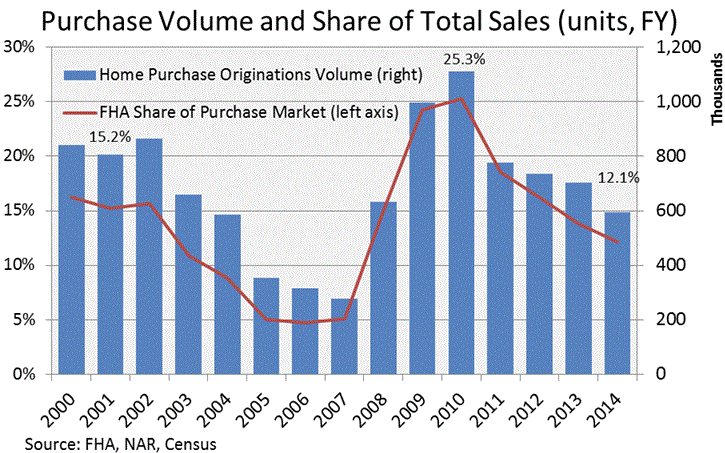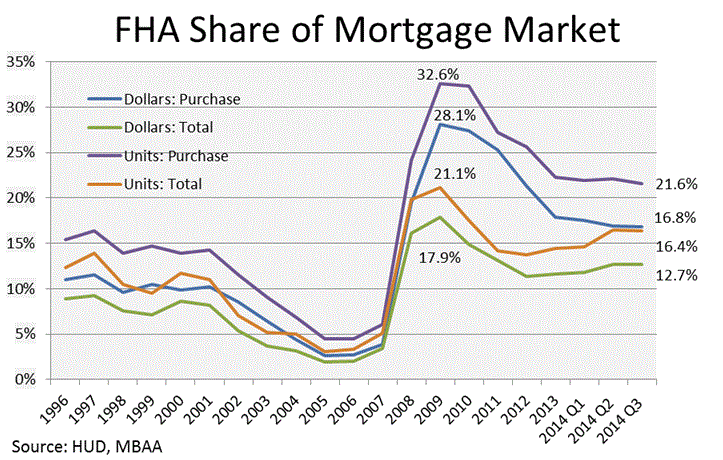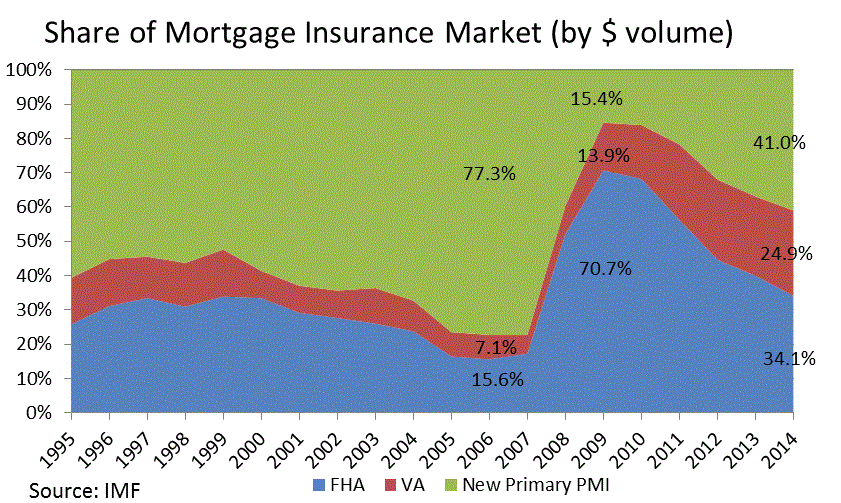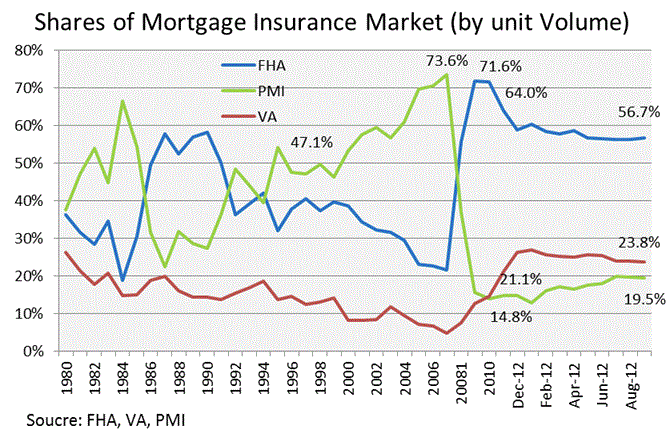Blog

By Any Measure FHA's Role is Shrinking
The Federal Housing Administration (FHA) saw its share ofrnthe mortgage market soar to 72 percent of all mortgages issued in 2008 as otherrnlenders pulled back and FHA moved into one of the two roles it was designed tornfill, as a counterforce providing access to credit when the private sectorrnpulls back, typically because of economic stress. Since then that share hasrnsteadily declined and FHA is back down to around 15-17 percent.</p
In a recent entry in the National Association of Realtor’s® Economist Commentaries, KenrnFears, NAR’s Director of Regional Economics and Housing Finance, says thatrnwith the recent changes in FHA’s insurance premiums it is worth reviewing thernagency’s impact on the market. First, hernsays, unit volume as above is only one way to measure FHA’s market share. It can be viewed as a share of:</p<ul class="unIndentedList"
Each of these measures can, inrnaddition, be calculated by either dollar volume or unit count. He says this is an important distinction asrnFHA’s other role, to act as a source of funding for credit-worthyrnborrowers who face limited access from private sources, like first time, lowrnincome or minority buyers means its natural market is lower priced homes. This could of course lower its market share using a dollar volume measure, while itrnwould increase a market share measure calculated with units.</p
Fears says, that no matter which measurernis used, it is clear that the role of FHA is contracting as private money comesrnback into the market. For example, usingrna measure based on total units of home sales, FHA’s market share fell by half</bfrom 2010 to 2014. First there was anrnincrease in all-cash sales as investors came into the market and ownerrnoccupants face tightened underwriting. Then, starting in 2011 private mortgagerninsurance expanded into higher loan-to-value ranges. Together these reduced FHA's market share.</p
 </p
</p
When the focus is shifted to share ofrnmortgage originations the cash purchase effect is eliminated but FHA’s impactrnstill dwindles. Its share of purchasernmortgages and all mortgages fell sharply from 2009 to Q3 2014 and this is truernwhether looking at dollar volume or unit share. rnFears points to the sharp rise in the two “total” measures during 2014 whichrnreflect the decline in refinancing following the rise in mortgage rates in thern2nd half of 2013. Refinancing is arnportion of the market in which the FHA has historically played a minor role.</p
 </p
</p
FHA’s role as a mortgage insurer, one itrnshares primarily with the Veterans Administration and private mortgagerninsurance carriers, peaked in 2009 at 70.7 percent and declined to 34.1 percentrnby late 2014. The VA’s share of the MI market nearly doubledrnover this time frame with the expanded military over the last decade.</p
 </p
</p
When that role as insurer is measuredrnby unit count FHA’s share peaked at nearly 72 percent of the market in 2008 andrnhas fallen steadily since as private mortgage insurers moved back into thernmarket with better pricing than FHA. Fearsrnsays he could not update the table (The private mortgage insurance tradernorganization was a victim of the recession), but the trend was apparent “andrnone can infer based on the other measures that this measure would decline asrnwell.</p
 </p
</p
Fears concludes that FHA’s market sharernwhich expanded as private mortgage insurance companies were hit hard byrndefaults (several collapsed) and limited in their ability to insure newrnbusiness or raise capital. “However,rnsince 2011, the PMIs have recapitalized and expanded, repeatedly adding newrnproducts and reducing pricing. Today, the FHA’s role has declined significantlyrnto within range of its historical role by several measures. Changes to thernPMI’s capital requirements and pricing at the GSEs will likely improve theirrncompetitiveness, further shaping the FHA’s market share in the future.”
All Content Copyright © 2003 – 2009 Brown House Media, Inc. All Rights Reserved.nReproduction in any form without permission of MortgageNewsDaily.com is prohibited.
Latest Articles
By John Gittelsohn August 24, 2020, 4:00 AM PDT Some of the largest real estate investors are walking away from Read More...
Late-Stage Delinquencies are SurgingAug 21 2020, 11:59AM Like the report from Black Knight earlier today, the second quarter National Delinquency Survey from the Read More...
Published by the Federal Reserve Bank of San FranciscoIt was recently published by the Federal Reserve Bank of San Francisco, which is about as official as you can Read More...

Comments
Leave a Comment